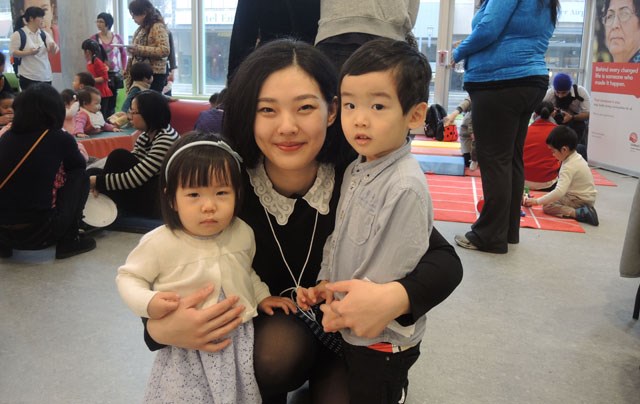Edging towards her questioner amid the screaming and yelling echoing off the walls of the community centre, Judy Valsonis explains why children in Richmond’s City Centre neighbourhood need more help than others.
The Touchstone Family Association’s executive director cited recent data which highlights pre-schoolers in City Centre are the most at risk of isolation — not least due to the fact the majority of them are growing up in high-rises and often in the care of their non-English speaking grandparents.
It’s that same isolation that can lead to socialization issues and other problems for a child by the time he or she reaches kindergarten.
According to the United Way, one in three kids in B.C. starts kindergarten with odds stacked against their success — in the classroom and later in life. In Richmond’s City Centre neighbourhood, this number is worse; almost one in two.
For that reason, Valsonis was more than happy to receive on Friday $300,000 in funding from the Lower Mainland wing of the United Way charity, to help kick-start two initiatives specific to City Centre: “Vertical Parenting” and “Neighbourhood Connectors.”
“We understand that more and more families are living in high-rises and becoming more isolated because they don’t really see their neighbours,” said Valsonis, when asked why the program was focusing first on City Centre and, in particular, the area around Cook elementary on Cook Road.
“The data shows City Centre is more vulnerable when it comes to the isolation of children and especially in terms of getting them ready for school.”
The volunteer neighbourhood connectors, who will likely be Chinese-speaking, will be like ambassadors, said Valsonis. They will be trained by the non-profit, Richmond-based Touchstone to support families new to the neighbourhood and help them connect to their community.
“The connectors will be from that particular neighbourhood as well,” Valsonis added.
“The families they will be helping will be identified through various Touchstone programs.”
The “Vertical Parenting” program will take longer to seed, said Valsonis, who cited research in Hong Kong and Holland about the vulnerability of children being raised in high-rises.
“We plan to hold focus groups on this in April: with parents from those buildings, those high-rises, hopefully attending,” she said.
“But we have to find out first who’s living in those buildings and then also maybe work with developers to create more social and green spaces in and around their buildings.”
In terms of the barrier of English being a second language, at best, for many children and families in City Centre, Valsonis said the goal is to reduce child vulnerability by helping families connect with their neighbourhoods and community.
“The Chinese language is used the most in City Centre and we’re not just an English-speaking community anymore,” she said.
“And there are many children who are being looked after by their grandparents, who don’t speak English, and don’t come out of their homes that often.
“Getting them out (of their homes) is the first step in reducing that isolation and that’s why we offer these things in Chinese; we have to get them out first. But we do tell people that, in order to be successful, they have to learn to speak English.”
Valsonis said Touchstone does try to talk to the people in question in English and does bring in English-speaking presenters for its programs, as well.
Friday’s launch of the program, under the umbrella of United Way’s “Avenues of Change” initiative, was translated into Chinese for the benefit of the community centre audience.
Acting City of Richmond mayor Derek Dang kicked off the event by describing a city that is growing and becoming increasingly diverse; he noted that the audience in the room, about 90 per cent of which were Chinese ethnicity, was an example.
Dang described Richmond as being a “cosmopolitan city” and partnering with United Way helped maintain the livability of the city.
“This gives children the best opportunity to move ahead and eventually become good citizens,” he added.
Michael McKnight, president and CEO of United Way of the Lower Mainland, said the funding was, “an investment in this neighbourhood and is a catalyst for change.”
“From research we did with UBC, having English as a second language was a critical barrier for a child reaching its full potential,” McKnight told the News.
“Socialization is so important in preparing them for kindergarten. Otherwise, there is a high level of child vulnerability.
“This funding can help with parenting skills and quality childcare. But we need the parents to identify what they need; essentially, the parents will define it, but they have to have motivation.”
Lea Li — a stay-at-home mom-of-two toddlers, who used to work 70 hours a week in IT and lives in a four-storey apartment building in the Cook neighbourhood — told the audience about her struggles getting her young son to pre-school.
“He was crying all the time and it was very hard to find a way to get him to play more with kids,” said Li, who immigrated from China three years ago.
Li told of Touchstone and school district programs that helped her make connections with other parents in her neighbourhood and how her children are now getting more socialized.



